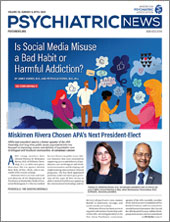VA Issues Final Rule to Implement Loan Repayment Program
Abstract
The rule states that for the purposes of the pilot program, the VA is considering only those who are enrolled in the final year of a psychiatry residency.
The Department of Veterans Affairs (VA) published a final rule in the Federal Register in late September outlining requirements for eligibility in the Program for the Repayment of Educational Loans (PREL) established last year by the Clay Hunt Suicide Prevention for American Veterans (SAV) Act.
The PREL, and the final rule that implements it, is intended to increase the pool of qualified VA psychiatrists through repayment of student loans in exchange for a commitment to serve in the VA for two years.
The Clay Hunt SAV act was signed by President Obama on February 12, 2015.
“Too many of our troops and veterans are still struggling, recovering from injuries and mourning fallen comrades,” said Obama in remarks at the signing ceremony in the East Room of the White House. “For many of them the war goes on, and we will not be satisfied until every man and woman in uniform gets the help they need to stay strong and healthy. It’s not a sign of weakness to ask for help; it’s a sign of strength.”
The law was named for Clay Hunt, a U.S. Marine veteran of the Iraq and Afghanistan wars who died by suicide in 2011. Hunt’s mother and stepfather, Susan and Richard Selke, and his father and stepmother, Stacy and Dianne Hunt, attended the White House ceremony. The Selkes were especially active in advocating for passage of the law, which APA strongly supported.
APA CEO and Medical Director Saul Levin, M.D., M.P.A., attended the signing ceremony with then APA President Paul Summergrad, M.D. (Psychiatric News, March 6, 2015).
“APA is proud to have worked alongside veterans groups like the Iraq and Afghanistan Veterans of America to push for this new law,” said Levin. “We are committed to providing our veterans with the quality mental health care they deserve, and the Clay Hunt SAV Act is an important step forward in improving their access to care.”
The loan repayment section of the law seeks to recruit at least 10 new psychiatrists each year over three years to fill vacant full-time positions in the Veterans Health Administration (VHA). Until implementation of the PREL, it was difficult for the VHA to compete with employers that offer employment incentives, such as medical school loan repayment. (The Veterans Health Administration is the VA’s integrated care system providing care at 168 VA medical centers and 1,053 VA outpatient sites, serving more than 8.9 million veterans each year.)
The final rule describes eligibility requirements, the application process, award procedures, and the rules of obligated service, among other provisions of the program.
The rule notes that the law describes eligible individuals as either licensed or eligible for licensure to practice psychiatric medicine in the VA or enrolled in the final year of a residency program leading to a specialty qualification in psychiatric medicine that is approved by the Accreditation Council for Graduate Medical Education.
But in the rule, the VA states, “[F]or this pilot program, we are only considering those that are enrolled in the final year of residency program leading to a specialty qualification in psychiatric medicine to allow VA to draw from a new pipeline of applicants by securing their commitment to VA service while still in residency.”
Obligated service is for two years and “must be full-time, permanent employment and does not include any period of temporary or contractual employment,” according to the VA.
Additionally, the VA notes that to make the best use of available resources, the administration “reserves the right to make the final decision on where the participant is assigned to complete his or her obligated service. VA will make every effort to take into consideration the participant’s preference; however, if there is no immediate need for a clinical employee in psychiatric medicine in the participant’s preferred location, VA will assign the participant to a VA medical facility that is in need of the participant’s field of expertise.” ■
The final rule for the repayment program can be accessed here.



